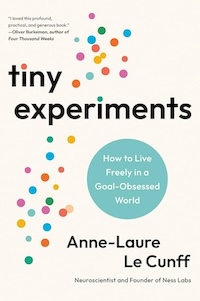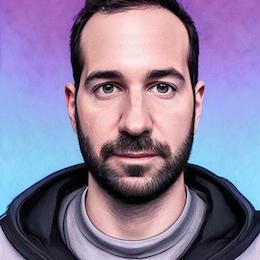
Tiny Experiments by Anne-Laure Le Cunff is a book about a different way to approach work and life. It revolves around curiosity, mindful productivity and collaborating with uncertainty. Here are some notes from the book:
- SMART goals framework is based on linear goals: they were created for controlled environments that lend to readily measurable outcomes with predictable timelines.
- What experiment could I run on my own life that would bring me an intrinsic sense of fulfillment, whatever the outcome?
- A pact is a commitment (e.g. “I will [action] for [duration]”) that is more about doing, observing, and adapting than about guaranteeing a fixed outcome.
- Nobody really wants to live a productive life. We want to express ourselves, connect with others, and explore the world. Nature had not intended mankind to work from eight in the morning until midnight.
- Embracing Kairos means letting go of the Taylorist ideal of maximizing every minute and instead appreciating the unique qualities of each moment that make up life.
- For a week or two, make note of energy levels at different times of the day so you can identify your energy peaks and troughs. Energy naturally fluctuates; attempting to maintain a perpertual peak is not just impossible but detrimental to your well-being.
- The key is to use sequential focus - doing one thing at a time.
- Stress isn’t always bad for us. In fact, a certain degree of stress can boost performance.
- A lot of the pain we experience when we procrastinate stems from viewing it as an enemy to fight against and over-come, instead of a partner to understand and collaborate with.
- Should is a shame-based statement that creates stress and anxiety in your body and mind.
- Whenever you see me somewhere succeeding in one are of my life, that almost certainly means that I am failing in another area of my life. Striving to put 100 percent effort into everything you do is a recipe for burnout. Accepting that not everything has to be perfect leads to a less pressured yet more fulfilling life.
- Buddhism teaches that suffering arises from attachment to desires, including the desire for control over outcomes. Taoism talks about wu wei, which can be translated as “effortless action”. This doesn’t mean inaction but rather acting in harmony with the flow of life, without force or resistance.
- As Vivian Greene puts it: “Life isn’t about waiting for the storm to pass. It’s about learning to dance in the rain.”
- After years of inner work, Michael Singer arrived at the same conclusion: “I could see that the practice of surrender was actually done in two, very distinct steps: first, you let go of the personal reactions of like and dislike that form inside your mind and heart; and second, with the resultant sense of clarity, you simply look to see what is being asked of you by the situation unfolding in front of you.”
- Researchers have found that flow states happen more easily in group activities than in solitary ones.
- Did you know that Giorgio Armani started a career in medicine before becoming one of the world’s top fashion designers? That Harrison Ford was a carpenter for fifteen years before being catapulted to stardom with Star Wars? That Pope Francis II was a bouncer at a Buenos Aires nightclub before becoming the Pope?
- The best long-term fuel source is some repeated act that energizes you in a way that then lets you become a generative person, who uses the energy to make things for others.
Coming from a tech background like the author, many of the concepts in the book were already familiar to me. I particularly enjoyed the sections on procrastination and letting go of outcome fixation. Overall, I think the book might be more valuable for readers outside the tech world.
